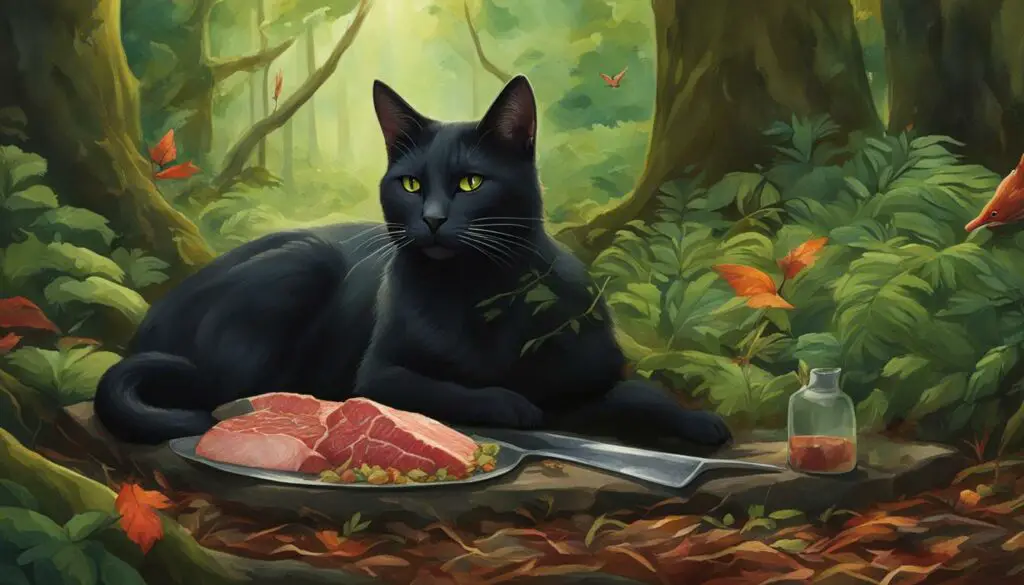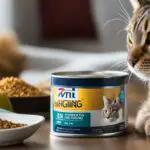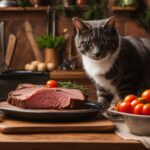When it comes to feline nutrition, finding the right protein source for your cat is essential. One option to consider is venison. But is venison good for cats? Let’s explore the benefits of venison for cats and how it can be a valuable addition to their diet.
Venison is a lean meat that offers significant amounts of protein with less fat compared to other red meats. It’s packed with essential nutrients like iron, zinc, and B vitamins, making it a healthy choice for cats. What sets venison apart is its status as a novel protein source for many cats. This means it can be an alternative to more common proteins, making it suitable for cats with food sensitivities or allergies.
However, it’s important to consider the nutritional benefits and potential risks of feeding venison to cats. Choosing a high-quality cat food that includes venison as an ingredient ensures your cat receives the necessary nutrients while minimizing potential drawbacks.
Key Takeaways:
- Venison is a lean meat that offers significant amounts of protein with less fat than other red meats.
- It is rich in essential nutrients like iron, zinc, and B vitamins.
- Venison can be an alternative protein source for cats with food sensitivities or allergies.
- Choose a high-quality cat food with venison as an ingredient to ensure nutritional balance.
- Introduce venison gradually and monitor your cat for any signs of allergies or intolerance.
The Nutritional Benefits of Venison for Cats
Venison offers several key nutritional benefits that make it a healthy protein option for cats. Firstly, it is high in protein, providing the essential amino acids that cats need, including taurine. Taurine is important for feline heart health, vision, and overall development. Additionally, venison is a good source of omega-3 fatty acids, which have anti-inflammatory properties and support a healthy coat and skin. Venison also contains a well-balanced ratio of omega-3 to omega-6 fatty acids, promoting optimal health.
Aside from protein and fatty acids, venison is rich in various essential vitamins and minerals. It is particularly abundant in B vitamins, vitamin K, zinc, and iron. B vitamins are important for energy metabolism, while vitamin K is essential for blood clotting. Zinc plays a crucial role in immune function, and iron is necessary for the production of red blood cells.
Furthermore, venison is a lean meat with fewer calories compared to other red meats such as beef, pork, and lamb. This can be beneficial for cats who need to lose weight or maintain a healthy body weight. With its nutritional profile and lower calorie content, venison can be a valuable addition to a feline diet.
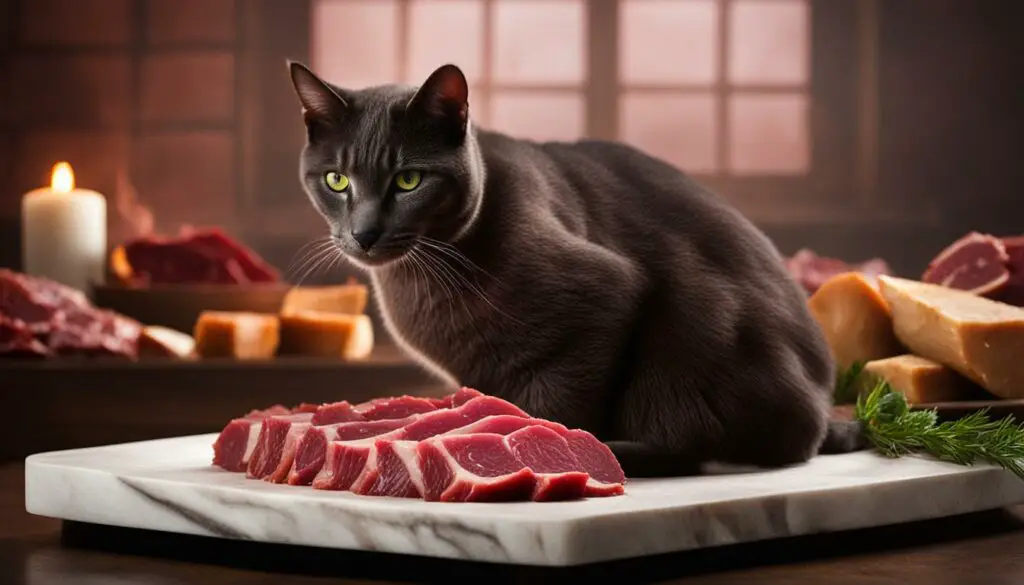
Table: Nutritional Composition of Venison
| Nutrient | Amount per 100g |
|---|---|
| Protein | 26.8g |
| Fat | 3.2g |
| Iron | 3.0mg |
| Zinc | 4.4mg |
| Vitamin B12 | 3.6μg |
Source: Nutrient composition data from the USDA National Nutrient Database for Standard Reference.
When to Consider Venison as a Protein Option for Cats
Venison can be considered as a protein option for cats in certain cases. It is a lower calorie protein than beef or pork, making it suitable for cats who need to lose weight or maintain a healthy body weight. Additionally, venison can be an alternative for cats with food allergies or sensitivities, as it is less commonly encountered and may be better tolerated. However, it’s important to introduce venison gradually and monitor for any signs of allergies or intolerance.
Feeding cats venison can be beneficial in helping them achieve their weight management goals. The lower calorie content of venison compared to other meats can assist in maintaining a healthy body weight, especially for cats prone to weight gain. Additionally, the lean nature of venison makes it a suitable protein option for cats with sensitivities to higher-fat meats.
For cats with food allergies or sensitivities, venison can be a novel protein source that they have not been previously exposed to. This can be particularly helpful in cases where cats may have developed adverse reactions to more common protein sources such as chicken or beef. However, it’s important to introduce venison gradually and monitor your cat for any signs of allergies or intolerance, such as digestive upset, skin irritations, or changes in behavior.
In conclusion, venison can be a viable protein option for cats in specific circumstances. It is important to consider your cat’s individual needs, monitor their response to venison, and choose a high-quality cat food that incorporates venison as an ingredient. Consulting with your veterinarian can provide guidance on whether venison is appropriate for your cat’s diet and how to incorporate it safely and effectively.
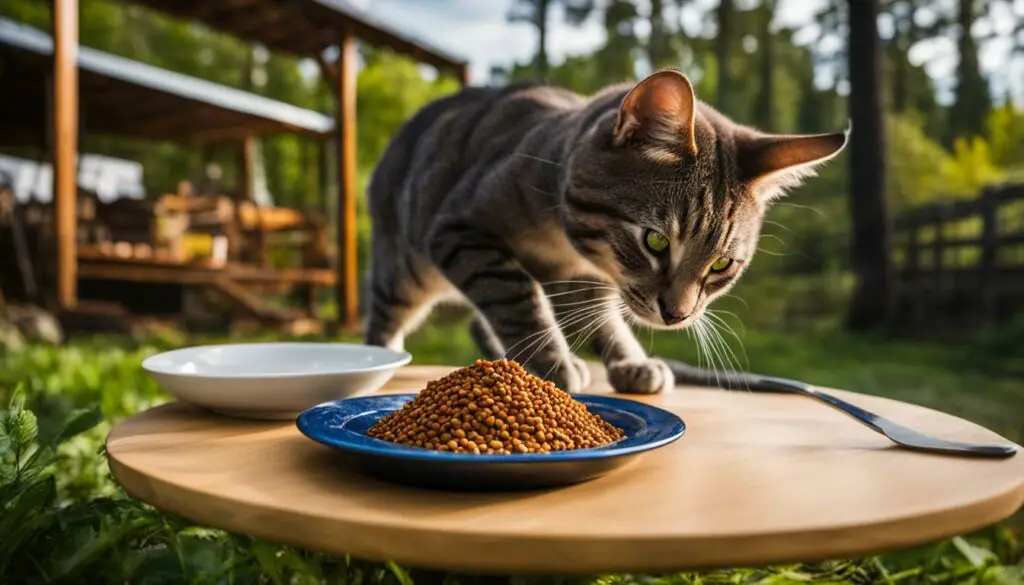
Choosing the Best Venison Cat Food
When it comes to choosing the best venison cat food, there are a few key factors to consider. Ensuring that the cat food meets the nutritional requirements established by the Association of American Feed Control Officials (AAFCO) is crucial. Look for a cat food that contains a minimum of 26% crude protein for adult cats and 9% fat for cats in all life stages. It is also important to examine the ingredient list and prioritize cat foods where an animal source of protein is listed as the first ingredient. Ideally, animal ingredients should be among the top three on the list.
In addition to meeting these protein and fat requirements, it can be beneficial to choose a cat food that includes supplements such as prebiotics, probiotics, antioxidants, and animal sources of omega-3 fatty acids. These supplements can support a cat’s overall health and well-being.
On the other hand, it is advisable to avoid cat foods that contain excessive plant ingredients and those that include by-product meals and artificial additives. These ingredients may not provide optimal nutrition for your cat and could potentially lead to health issues in the long run.
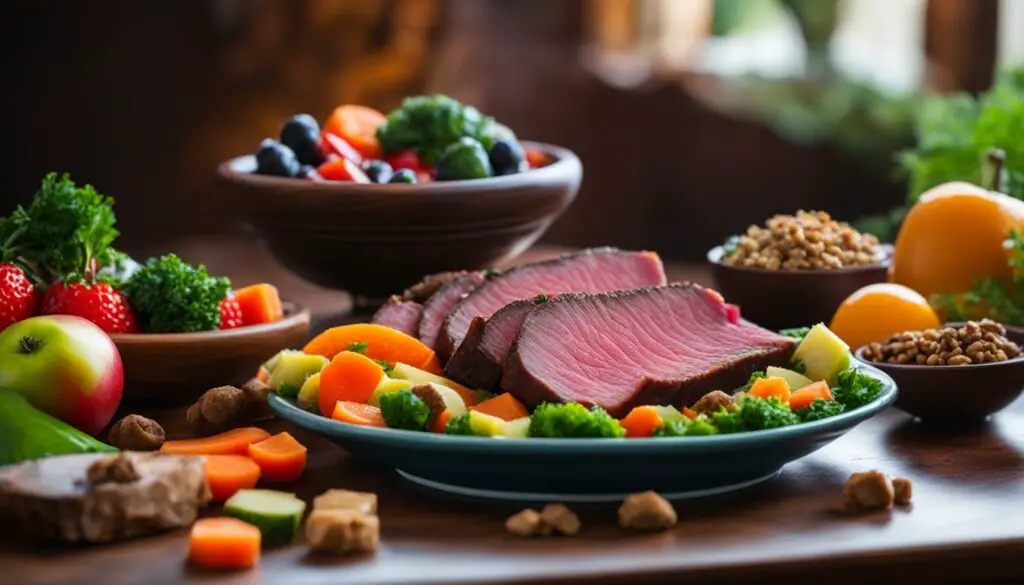
Table: Comparison of Top Venison Cat Foods
| Brand | Protein Content | Fat Content | Additional Supplements | Price Range |
|---|---|---|---|---|
| Brand A | 30% | 12% | Probiotics, Omega-3 Fatty Acids | $$$ |
| Brand B | 28% | 10% | Prebiotics, Antioxidants | $$ |
| Brand C | 26% | 8% | Omega-3 Fatty Acids, Vitamins | $ |
Note: Pricing ranges from $ (affordable) to $$$$ (premium).
While this table provides a general comparison, it’s important to consider your cat’s individual needs and preferences when selecting a venison cat food. Consult with your veterinarian for personalized advice and recommendations based on your cat’s specific nutritional requirements and any health considerations.
Top Picks for Venison Cat Foods
When it comes to choosing the best venison cat food, there are several options available in the market. These cat foods offer the nutritional benefits of venison while providing a balanced and complete diet for your feline companion. Here are some top picks for cat foods with venison:
1. Brand A Venison Recipe
This cat food is formulated with real venison as the main ingredient, ensuring a high-quality source of protein for your cat. It contains a balanced blend of vitamins, minerals, and antioxidants to support your cat’s overall health. The recipe also includes omega-3 fatty acids to promote a healthy skin and coat.
2. Brand B Venison and Vegetable Medley
This cat food combines the goodness of venison with a variety of vegetables to provide a nutrient-rich meal for your cat. It contains a mix of essential vitamins and minerals to support your cat’s immune system and promote optimal digestion. The recipe is free from artificial additives and preservatives, making it a wholesome choice for your furry friend.
3. Brand C Grain-Free Venison Formula
This grain-free cat food offers a limited ingredient formula with venison as the primary protein source. It is specifically designed for cats with food sensitivities or allergies. The recipe is free from grains, gluten, and common allergens, making it suitable for cats with dietary restrictions. It contains a balanced blend of nutrients to support your cat’s overall well-being.
When choosing a venison cat food, it’s important to consider your cat’s specific dietary needs and consult with your veterinarian if you have any concerns. Remember to introduce new foods gradually and monitor your cat’s response to ensure it suits their individual needs.
| Brand | Key Features |
|---|---|
| Brand A Venison Recipe | Real venison as main ingredient Balanced blend of vitamins and minerals Omega-3 fatty acids for a healthy coat |
| Brand B Venison and Vegetable Medley | Combination of venison and vegetables Nutrient-rich formula No artificial additives or preservatives |
| Brand C Grain-Free Venison Formula | Limited ingredient formula Grain-free and gluten-free Suitable for cats with sensitivities or allergies |
Picky Eaters and Allergies
When it comes to introducing venison into a cat’s diet, it’s important to keep in mind that some cats can be picky eaters or develop allergies to certain foods. Venison may not be immediately accepted by picky eaters due to its unique taste and smell. If your cat shows hesitation or disinterest in venison, try gradually introducing it alongside their regular food to increase familiarity and acceptance.
However, it’s crucial to watch out for any signs of allergies or sensitivities that your cat may have towards venison. Some cats can develop allergic reactions, which can manifest in various ways such as itchy skin, recurrent ear infections, and digestive issues like vomiting or diarrhea. If you notice any of these symptoms after introducing venison, it’s vital to consult with your veterinarian for further guidance and evaluation.
In cases where your cat already has a known food allergy, such as to chicken, beef, or fish, it’s advisable to consult with your veterinarian before introducing venison into their diet. Your veterinarian can provide personalized recommendations and help determine if venison is a suitable protein option for your cat based on their specific dietary needs and health condition.
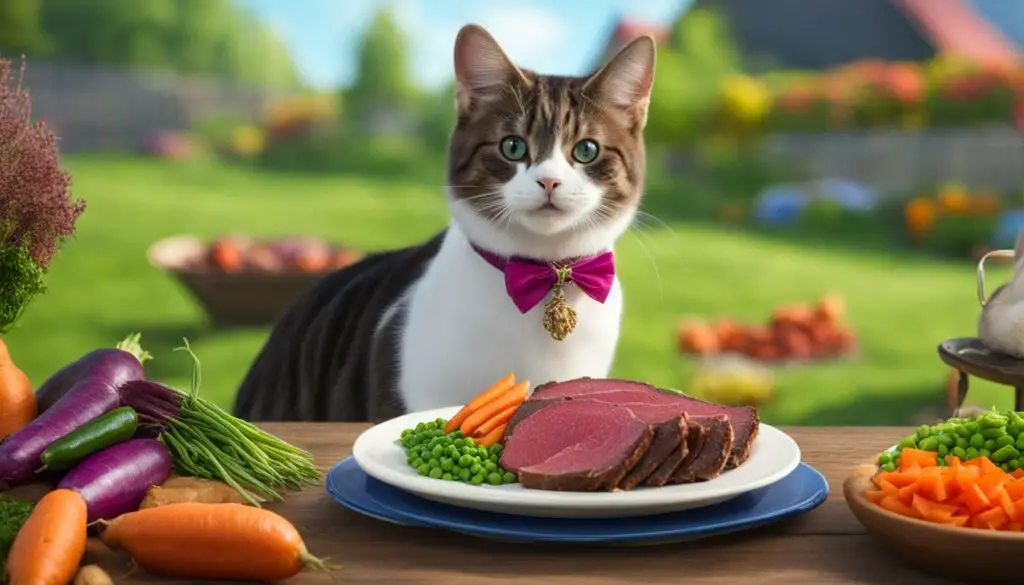
Table: Common Signs of Allergies in Cats
| Signs of Allergies | Description |
|---|---|
| Itchy skin | Cat may scratch excessively, lick, or bite at their skin |
| Recurrent ear infections | Ear redness, discharge, or unusual odor |
| Digestive issues | Vomiting, diarrhea, or changes in stool consistency |
Cooking and Preparing Venison for Cats
When it comes to cooking and preparing venison for cats, there are a few important considerations to keep in mind. First and foremost, it’s crucial to ensure that the venison is cooked thoroughly to eliminate any potential harmful bacteria. This is especially important for the safety and well-being of your feline friend. Additionally, be sure to remove any bones from the venison to prevent any choking hazards.
When cooking venison for cats, it’s best to avoid adding any oils, seasonings, or additives such as salt, butter, or garlic. These ingredients can be harmful to cats and may cause digestive issues. It’s always safest to keep the venison plain and free from any additional flavorings. Finally, consider cutting the venison into small, bite-sized pieces to make it easier for your cat to consume.
By following these guidelines and taking the necessary precautions, you can ensure that your cat enjoys a safe and delicious venison meal. However, it’s always recommended to consult with your veterinarian before introducing any new foods into your cat’s diet, including venison, especially if your cat has any specific dietary restrictions or health concerns.
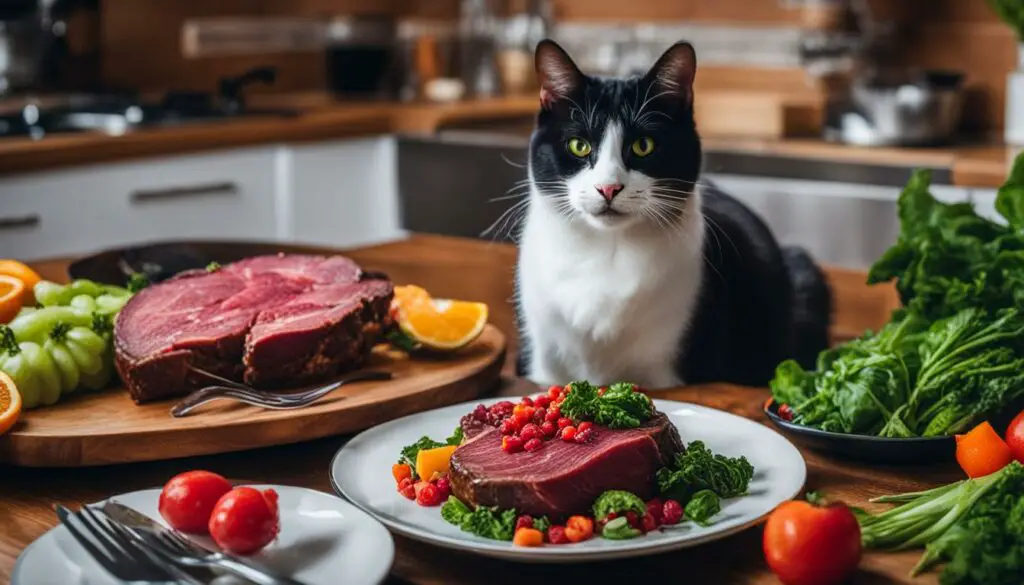
Table: Cooking and Preparing Venison for Cats
| Guidelines | Details |
|---|---|
| Cooking | Cook venison thoroughly to eliminate harmful bacteria. |
| Bone Removal | Remove any bones from the venison to prevent choking hazards. |
| Avoid Additives | Avoid adding oils, seasonings, salt, butter, or garlic to the venison. |
| Size Matters | Cut the venison into small, bite-sized pieces for easy consumption. |
The Risks of Feeding Raw Venison to Cats
If you’re considering feeding your cat a raw diet, it’s important to be aware of the potential risks associated with feeding raw venison. While cats are biologically designed to consume raw meat, there is a risk of bacterial contamination in raw foods, including venison. Raw meat can harbor pathogens such as Salmonella, E. Coli, and Listeria, which can pose serious health risks to cats.
Feeding raw venison to cats can increase the likelihood of bacterial infection, leading to symptoms such as vomiting, diarrhea, fever, and lethargy. Cats with weakened immune systems, such as kittens, elderly cats, or cats with underlying health conditions, are particularly vulnerable to these infections. In severe cases, bacterial infections can even be life-threatening.
To ensure the safety and well-being of your cat, it is best to cook venison thoroughly before feeding it to them. Cooking meat at a proper temperature kills harmful bacteria, reducing the risk of bacterial contamination. By cooking venison, you can provide your cat with a safe and nutritious protein source without compromising their health.
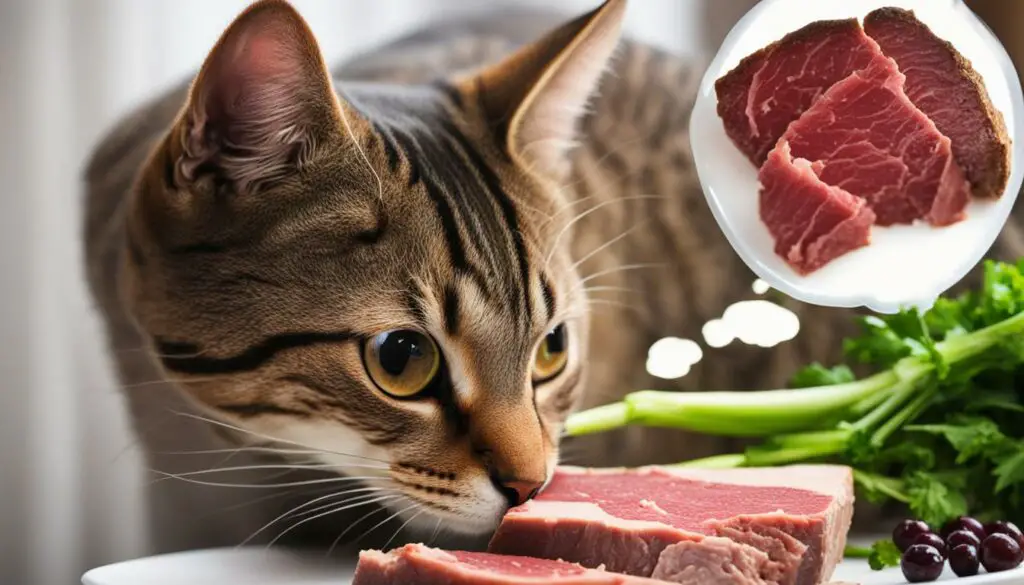
Frequently Asked Questions
- Can cats eat raw venison if it’s sourced from a reputable supplier?
- What are the benefits of cooking venison for cats?
- Are there any alternative protein options for cats?
While sourcing venison from a reputable supplier can reduce the risk of bacterial contamination, it does not completely eliminate it. Even well-handled raw meat can still carry pathogens that can cause illness in cats. Therefore, it is recommended to cook venison thoroughly before feeding it to your cat.
Cooking venison ensures that any potential harmful bacteria are eliminated, minimizing the risk of bacterial infections in cats. Additionally, cooking venison can enhance its digestibility and make it easier for your cat to chew and digest.
If you’re looking for alternative protein options for your cat, you can consider lean, cooked meats such as chicken, turkey, or fish. These protein sources can provide essential nutrients without the risks associated with raw meat.
Proper Portion Sizes of Venison for Cats
When it comes to feeding venison to cats, it’s essential to understand the proper portion sizes. The amount of venison a cat can have depends on the form in which it is offered. If your cat’s commercial diet contains venison, they can eat it daily as part of a complete and balanced formula. However, when it comes to home-prepared venison or other meats, it’s important to consider them as treats and not a replacement for a complete and balanced cat food diet. Treats and human foods should only make up about 10% of a cat’s daily calorie intake.
Feeding appropriate portion sizes is crucial to ensure that your cat receives the necessary nutrients without exceeding their dietary needs. Overfeeding venison or any other protein source can lead to weight gain and potential health issues. It’s best to consult with your veterinarian to determine the ideal portion sizes for your cat based on their individual needs, age, weight, and activity level.
Remember, moderation is key when it comes to incorporating venison into your cat’s diet. While it can be a beneficial protein source, it should be offered in controlled amounts to maintain a healthy balance in their overall nutrition.
| Cat’s Weight | Venison Portion Sizes |
|---|---|
| 5 lbs (2.3 kg) | Approximately 1 ounce (28 grams) |
| 10 lbs (4.5 kg) | Approximately 2 ounces (57 grams) |
| 15 lbs (6.8 kg) | Approximately 3 ounces (85 grams) |
These portion sizes serve as a general guideline. However, it’s crucial to remember that each cat is unique, and their dietary needs may vary. Always monitor your cat’s weight and overall health, making adjustments to portion sizes as necessary. Consulting with a veterinarian will help ensure your cat’s diet is well-balanced and meets their specific nutritional requirements.
Allergies and Sensitivities to Venison in Cats
While venison can be a beneficial protein source for cats, it’s essential to be aware that cats can develop allergies or sensitivities to this meat. Although it is not as common as allergies to chicken, beef, or fish, some cats may exhibit adverse reactions to venison. Allergic reactions in cats can manifest as skin issues like itchiness, rashes, and hair loss, as well as gastrointestinal problems such as vomiting and diarrhea.
If you suspect that your cat may have a food allergy, it is crucial to consult with your veterinarian for a proper diagnosis. Your veterinarian can conduct allergy tests or recommend an elimination diet to determine the specific allergen causing your cat’s symptoms. With a proper diagnosis, you can then work with your veterinarian to develop a suitable diet plan for your cat’s needs.
When feeding venison to your cat, it’s essential to introduce it gradually and monitor your cat for any adverse reactions. Start by offering a small amount of venison and observe how your cat responds. If there are no signs of allergies or sensitivities, you can continue to incorporate venison into your cat’s diet. However, if your cat shows any negative reactions, such as itching or digestive issues, it may be best to avoid feeding them venison in the future.
| Symptoms of Food Allergies in Cats |
|---|
| Itchy skin |
| Rashes |
| Hair loss |
| Vomiting |
| Diarrhea |
Remember, every cat is unique, and their dietary needs and tolerances may vary. It’s always important to consult with your veterinarian for personalized advice and guidance on the best diet for your cat’s individual circumstances. They can help you navigate the world of cat food options, including venison, and ensure that your cat receives the nutrition they need without any adverse reactions.
Cat Preferences for Venison
Cats, like humans, have individual preferences when it comes to their food. Some cats may enjoy the taste of venison and readily accept it as part of their diet, while others may be less enthusiastic. It’s important to observe your cat’s response to venison and make adjustments accordingly. Keep in mind that cats can be picky eaters and may need time to adjust to new flavors and textures.
If your cat doesn’t seem to like venison, there are a few things you can try. Mixing small amounts of venison with their regular food can help them gradually get accustomed to the taste. You can also try different preparations or brands of venison cat food to find one that your cat prefers. Adding a small amount of moisture, such as warm water or low-sodium broth, to the venison can enhance the aroma and make it more appealing to your cat.
It’s important not to force your cat to eat something they don’t enjoy. If your cat consistently refuses to eat venison or shows signs of dislike, it may be best to explore other protein options that they find more enticing. Remember, a balanced and nutritious diet is essential for your cat’s health, so finding a protein source that they enjoy is crucial.
Table: Tips for Introducing Venison to Cats
| Tip | Description |
|---|---|
| Start with small amounts | Introduce venison gradually, mixing it with your cat’s regular food to help them adjust to the taste. |
| Experiment with different preparations | Try different brands or preparations of venison cat food to find one that your cat enjoys. |
| Enhance the aroma | Add a small amount of warm water or low-sodium broth to the venison to make it more appealing to your cat. |
| Observe your cat’s response | Pay attention to your cat’s reaction to venison and make adjustments based on their preferences. |
| Consult with your veterinarian | If your cat consistently refuses to eat venison or shows signs of dislike, consult with your veterinarian for alternative protein options. |
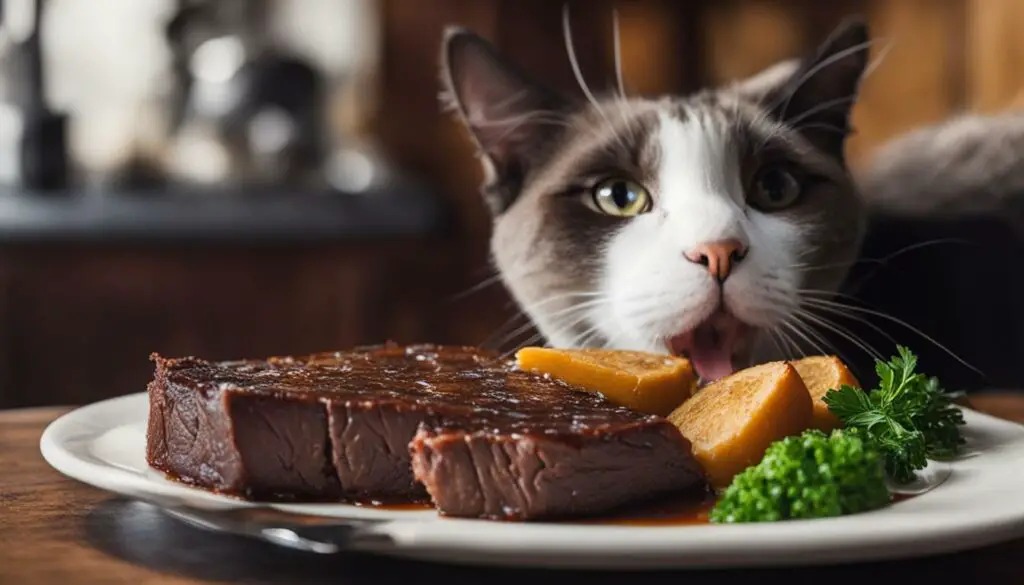
In conclusion, while some cats may enjoy the taste of venison, others may not be as enthusiastic. It’s important to respect your cat’s preferences and find a protein source that they enjoy. Introduce venison gradually, mix it with their regular food, and experiment with different preparations to see what works best for your furry friend. Remember to consult with your veterinarian for personalized advice tailored to your cat’s specific needs.
The Conclusion of Venison for Cats
After exploring the nutritional benefits, considerations, and proper preparation of venison for cats, it’s clear that this lean meat can be a valuable protein source for our feline friends. With its high protein content, essential amino acids, omega-3 fatty acids, and array of vitamins and minerals, venison offers a nutritious alternative to more common proteins. It can be particularly beneficial for cats who need to lose weight or have food allergies or sensitivities.
However, as with any new ingredient, it’s important to introduce venison gradually and monitor your cat for any signs of allergies or intolerance. Choose a high-quality cat food that includes venison as an ingredient, ensuring that it meets the nutritional requirements established by the AAFCO. Look for a recipe with animal sources of protein as the top ingredients and consider additional supplements like prebiotics, probiotics, antioxidants, and omega-3 fatty acids from animal sources.
Remember that venison should always be cooked thoroughly before feeding it to your cat to eliminate any potential harmful bacteria. Avoid adding oils, seasonings, or additives that could be harmful to your cat’s health. If your cat has a known food allergy, consult with your veterinarian before introducing venison into their diet. And as always, observe your cat’s preferences and adjust accordingly, making sure to prioritize their individual needs and overall well-being.
By understanding the nutritional benefits, considerations, and proper handling of venison as a protein option for cats, we can make informed choices and provide our feline companions with a varied and nutritious diet. Incorporate venison into your cat’s meal plan with caution and care, and consult with your veterinarian for personalized advice tailored to your cat’s specific needs.
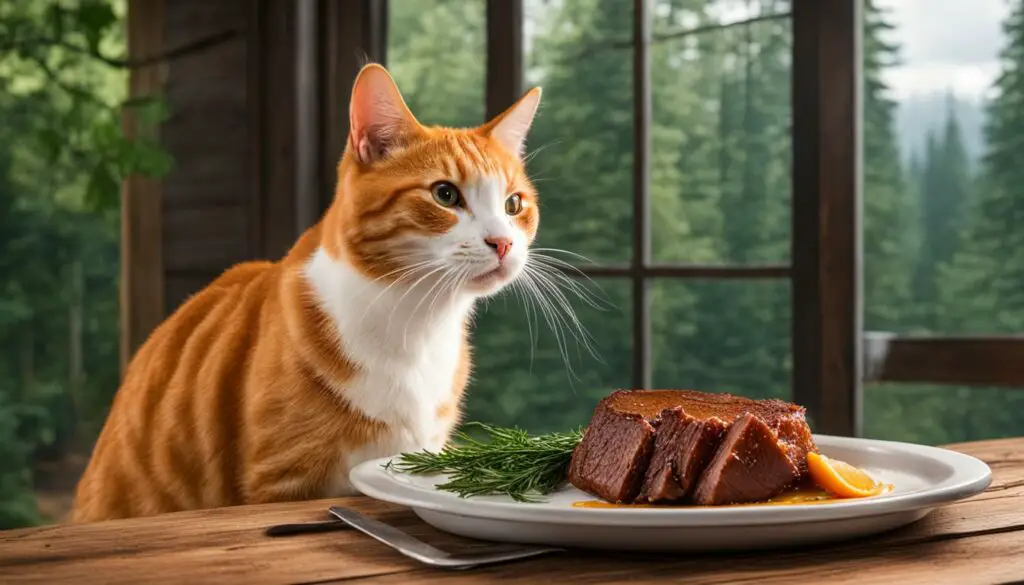
Additional Resources and Information
- Association of American Feed Control Officials (AAFCO)
- Cornell University College of Veterinary Medicine
- American Society for the Prevention of Cruelty to Animals (ASPCA)
Additional Resources and Information
For more information on feline nutrition and cat food options, consult the following sources:
– The American Association of Feline Practitioners (AAFP): The AAFP provides valuable resources and guidelines on feline nutrition, including information on feeding cats with specific dietary needs and recommendations for commercial cat foods.
– The American College of Veterinary Nutrition (ACVN): The ACVN is an organization of board-certified veterinary nutritionists. Their website offers a wealth of information on feline nutrition, including articles, research papers, and educational materials on cat food choices.
– Your veterinarian: Your veterinarian is the best source of personalized advice on feline nutrition and cat food options. They can assess your cat’s specific needs and provide recommendations tailored to their age, health condition, and dietary requirements.
Remember, choosing the right cat food and understanding your cat’s nutritional needs is crucial for their overall health and well-being. By consulting reputable sources and working closely with your veterinarian, you can make informed decisions about feline nutrition and provide your cat with a balanced and nutritious diet.
FAQ
Is venison good for cats?
Venison can be a beneficial protein source for cats, offering essential nutrients and potentially serving as an alternative for cats with food allergies or sensitivities. However, it’s important to introduce venison gradually, monitor for any signs of allergies or intolerance, and choose a high-quality cat food that meets the nutritional requirements for cats. Consult with your veterinarian for personalized advice tailored to your cat’s specific needs.
What are the nutritional benefits of venison for cats?
Venison is high in protein, providing essential amino acids that cats need, including taurine. It’s also a good source of omega-3 fatty acids with a well-balanced ratio of omega-3 to omega-6 fatty acids. Additionally, venison is rich in B vitamins, vitamin K, zinc, and iron. It is a lean meat with fewer calories compared to beef, pork, and lamb. These nutritional benefits make venison a potentially healthy protein source for cats.
When should I consider venison as a protein option for my cat?
Venison can be considered as a protein option for cats in certain cases. It is a lower calorie protein than beef or pork, making it suitable for cats who need to lose weight or maintain a healthy body weight. It can also be an alternative for cats with food allergies or sensitivities, as it is less commonly encountered and may be better tolerated. However, it’s important to introduce venison gradually and monitor for any signs of allergies or intolerance.
How do I choose the best venison cat food?
When selecting a venison cat food, it’s important to look for a recipe that meets the nutritional requirements established by the Association of American Feed Control Officials (AAFCO). The cat food should contain a minimum of 26% crude protein for adult cats and 9% fat for cats in all life stages. The first ingredient should be an animal source of protein, and ideally, animal ingredients should be among the top three on the ingredient list. It’s also beneficial to choose a cat food with supplements like prebiotics, probiotics, antioxidants, and animal sources of omega-3 fatty acids. Avoid cat foods with excessive plant ingredients and those containing by-product meals and artificial additives.
What are some top picks for venison cat foods?
Some top picks for cat foods with venison are [Provide a list of recommended venison cat foods].
Can cats develop allergies to venison?
Cats can develop allergies to venison, although it is not common. Food allergies in cats are more frequently reported for chicken, beef, and fish. Symptoms of food allergies in cats can include skin issues like itchiness, rashes, hair loss, and gastrointestinal problems such as vomiting and diarrhea. If you suspect your cat has food allergies, consult with your veterinarian for a proper diagnosis and guidance on the best diet for your cat’s needs.
How should I cook and prepare venison for cats?
When feeding cats venison, it should always be cooked thoroughly to ensure any potential harmful bacteria are eliminated. Remove any bones to prevent choking hazards. Avoid adding oils, seasonings, or additives like salt, butter, and garlic, as these can be harmful to cats. Cut the venison into small, bite-sized pieces for easy consumption.
Can cats eat raw venison?
Feeding raw venison to cats is not recommended, as raw meat may contain dangerous pathogens such as Salmonella, E. Coli, and Listeria. Cooking venison thoroughly is necessary to ensure the safety and well-being of your cat.
How much venison can cats have?
The amount of venison a cat can have depends on the form in which it is offered. If your cat’s commercial diet contains venison, they can eat it daily as part of a complete and balanced formula. However, home-prepared venison or other meats should be considered treats and should not replace a complete and balanced cat food. Treats and human foods should only make up about 10% of a cat’s daily calorie intake.
Do cats prefer venison?
Cats’ preferences for venison can vary. Some cats may enjoy the taste of venison and readily accept it as part of their diet, while others may be less enthusiastic. It’s important to observe your cat’s response to venison and make adjustments accordingly.
Where can I find additional resources and information on feline nutrition and cat food options?
For more information on feline nutrition and cat food options, consult the following sources: [Provide a list of additional resources and information].
Source Links
- https://excitedcats.com/can-cats-eat-venison/
- https://cats.com/best-venison-cat-food
- https://www.hillspet.com/cat-food/pd-dd-feline-venison-and-green-pea-formula-dry

